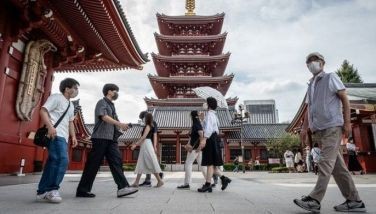HK says US got Snowden's middle name wrong
HONG KONG — Hong Kong officials say the U.S. government got National Security Agency leaker Edward Snowden's middle name wrong in documents it submitted to back a request for his arrest.
Snowden hid in Hong Kong for several weeks after revealing secret U.S. surveillance programs. Hong Kong allowed him to fly to Moscow on Sunday, saying a U.S. request for his arrest did not fully comply with its requirements.
Justice Secretary Rimsky Yuen said that discrepancies in the paperwork filed by U.S. authorities were to blame, although the U.S. Justice Department denied that Wednesday.
Yuen said Hong Kong immigration records listed Snowden's middle name as Joseph, but the U.S. government used the name James in some documents and referred to him only as Edward J. Snowden in others.
"These three names are not exactly the same, therefore we believed that there was a need to clarify," he said Tuesday.
Yuen said U.S. authorities also did not provide Snowden's passport number.
The decision to let Snowden leave Hong Kong irked the White House, which said it damaged U.S.-Chinese relations. U.S. officials implied that Beijing had a hand in letting Snowden leave Hong Kong, a former British colony that is now a semiautonomous region with its own legal system.
Hong Kong officials have pushed back, stressing that they followed the city's rule of law in processing the U.S. request.
The U.S. Justice Department rejected the notion Hong Kong had required clarification about Snowden's middle name — or that it needed his passport number, saying the U.S. had provided to Hong Kong all that was required under the terms of their extradition treaty.
"The fugitive's photos and videos were widely reported through multiple news outlets. That Hong Kong would ask for more information about his identity demonstrates that it was simply trying to create a pretext for not acting on the provisional arrest request," a spokeswoman said on condition of anonymity under ground rules set by the department.
Yuen said the confusion over Snowden's identification and his passport were among factors that delayed an arrest. He said the government requested clarification from its counterparts in the U.S. on Friday afternoon.
"Up until the moment of Snowden's departure, the very minute, the U.S. Department of Justice did not reply to our request for further information. Therefore, in our legal system, there is no legal basis for the requested provisional arrest warrant," Yuen said. In the absence of such a warrant, the "Hong Kong government has no legal basis for restricting or prohibiting Snowden leaving Hong Kong."
Snowden flew from Hong Kong to Moscow and was expected to seek asylum in Ecuador.
Simon Young, a Hong Kong University professor specializing in criminal law, said that because of the "political sensitivities" involved in the case, authorities had not rushed the case and were taking extra care.
"I think that the Hong Kong government was insisting on a fairly high standard of completeness, and that, I assume, is their practice. They know that our courts will look at these things very closely and they don't take shortcuts," he said.
But he and other legal experts said Hong Kong authorities are typically able to exercise their discretion and use other methods, such as a photo or physical description, to identify fugitives, who often use aliases.
"It's not like he's some mystery figure. He revealed himself on TV," Young said. "The whole world knows what he looks like. So again I didn't see this presenting problems of identification."
- Latest
- Trending
































